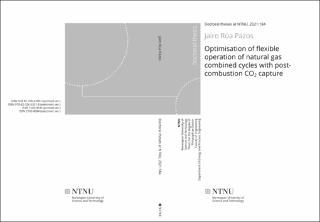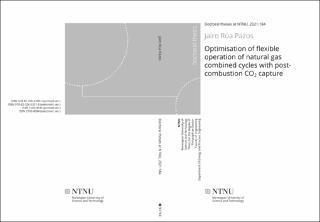| dc.contributor.advisor | Nord, Lars O. | |
| dc.contributor.advisor | Hillestad, Magne | |
| dc.contributor.author | Pazos, Jairo Rúa | |
| dc.date.accessioned | 2021-05-12T14:46:49Z | |
| dc.date.available | 2021-05-12T14:46:49Z | |
| dc.date.issued | 2021 | |
| dc.identifier.isbn | 978-82-326-5321-8 | |
| dc.identifier.issn | 2703-8084 | |
| dc.identifier.uri | https://hdl.handle.net/11250/2755233 | |
| dc.description.abstract | Anthropogenic greenhouse gas emissions have continuously grown since the Industrial Revolution. Global warming is the result of increasing concentrations of these gases in the atmosphere, which create imbalances between inflow and out-flow radiation that lead to the increase of the mean temperature of the planet.
There is scientific consensus on that the prolonged temperature rise of oceans and land has altered the climate and jeopardised the biosphere. Temperature increase above 1.5_C with respect to pre-industrial levels is likely to produce deep changes in natural ecosystems, alter biodiversity, and threaten human health and security. Therefore, current mitigation policies aim at reducing the overall emissions of greenhouse gases to restrain this temperature rise.
Decarbonisation of the power sector will play a fundamental role in the abatement of global warming as it is the largest CO2 emitter and electrification of other industries is becoming an essential approach to reduce their greenhouse gas emissions. Deployment of intermittent renewable energy sources, mainly wind and solar, has concentrated most of the efforts to reduce the emissions associated with the power sector. However, a broader portfolio of technologies is necessary to meet the increasing power demand whilst ensuring safe and sustainable power generation. In this context, flexibility is and will be the cornerstone of a reliable and efficient electric market. Thermal power plants integrated with carbon capture and storage (CCS) systems can deliver low-carbon electricity at a large scale and balance the differences between power demand and supply originated by the increasing share of renewable sources. Thus, these power generation systems are expected to be one of the foundations of the power sector.
This thesis is a summary of a set of scientific contributions that aimed at optimizing the flexible operation of thermal power plants integrated with absorption based post-combustion CO2 capture plants. These included the analysis of the dominant dynamic of this type of power generation systems, the identification of the main bottlenecks hindering their flexible operation and transient performance, and the development of different methodologies that allowed overcoming these restrictions and ensuring safe yet efficient dynamic operation.
Thermal power plants and post-combustion CO2 capture systems exhibit distinct dynamic behaviour because their dominant dynamics occur in different time scales. Flexible operation requires understanding the main factors dictating the dynamic performance of each plant and how their integration affects power generation. A qualitative analysis discussed the components and processes governing the dynamic behaviour of thermal power and capture plants, both individually and integrated, whereas dynamic simulations demonstrated the almost negligible effect of the capture plant in the power generation capacity of natural gas combined cycles. This indicated that carbon capture does not limit the dispatchable nature of this type of thermal power plants and highlighted the suitability of thermal power with CCS to balance power markets with large shares of intermittent renewable energy sources.
Thermal and mechanical stresses, however, do limit the ramping capacity of thermal power plants. Thick-walled equipment experiences large temperature gradients during flexible operation that generate high peaks of stress in the material and might ultimately lead to deformations and failure. This thesis presents a methodology to operate thermal power plants based on model predictive control that incorporates the calculation of stress in critical components. This control strategy computes optimal power generation ramps that result in the fastest possible operation with stress levels within allowable limits.
Stress monitoring can avoid the instant failure of critical components by reducing the maximum peaks of stress. Nevertheless, regular operation of thermal power plants induces damage in the equipment even with safe levels of stress. Flexible operation increases this deterioration and reduces the lifetime operation of the power plant due to the more frequent and pronounced thermal gradients and their associated stress variations. Scheduling can consider these factors to determine operation profiles for thermal power plants that maximise revenue while reducing the deterioration of the equipment and considering the inherent uncertainty associated with intermittent power generation from renewable energy sources. This approach is proposed in a method that formulates the scheduling of thermal power plants as a scenario-tree stochastic optimisation problem where the damage of the equipment is a constraint.
Optimisation-based control strategies also enhance the transient performance of thermal power plants integrated with post-combustion CO2 capture. Model predictive control can consider the di_erent dynamic behaviour of both plants and compute optimal control actions according to their dominant dynamics. A control strategy based on offset-free model predictive control is proposed to reinforce the flexible power dispatch of thermal power plants and to stabilise the the main process variables of integrated systems. Dynamic simulations demonstrated the effectiveness of this control strategy to balance drastic changes on power demand, keep specified capture ratios, and reduce the deviations achieved in the main process performance variables of these power systems. | en_US |
| dc.language.iso | eng | en_US |
| dc.publisher | NTNU | en_US |
| dc.relation.ispartofseries | Doctoral theses at NTNU;2021:184 | |
| dc.relation.haspart | Paper 1: Rúa, Jairo; Bui, Mai; Nord, Lars O.; Mac Dowell, Niall. Does CCS reduce power generation flexibility? A dynamic study of combined cycles with post-combustion CO2 capture. International Journal of Greenhouse Gas Control 2020 ;Volum 95.
https://doi.org/10.1016/j.ijggc.2020.102984 | en_US |
| dc.relation.haspart | Paper 2: Rúa, Jairo; Agromayor, Roberto; Hillestad, Magne; Nord, Lars O.. Optimal dynamic operation of natural gas combined cycles accounting for stresses in thick-walled components. Applied Thermal Engineering 2020 ;Volum 170.
https://doi.org/10.1016/j.applthermaleng.2019.114858
This is an open access article under the CC BY license.
( http://creativecommons.org/licenses/by/4.0/ ) | en_US |
| dc.relation.haspart | Paper 3: Rúa, Jairo; Nord, Lars O.. Optimal control of flexible natural gas combined cycles with stress monitoring: Linear vs nonlinear model predictive control. Applied Energy 2020 ;Volum 265.
https://doi.org/10.1016/j.apenergy.2020.114820
This is an open access article under the CC BY license.
( http://creativecommons.org/licenses/by/4.0/ ) | en_US |
| dc.relation.haspart | Paper 4: Rúa, Jairo; Verheyleweghen, Adriaen; Jäschke, Johannes; Nord, Lars O.. Optimal scheduling of flexible thermal power plants with lifetime enhancement under uncertainty. Applied Thermal Engineering 2021 ;Volum 191
https://doi.org/10.1016/j.applthermaleng.2021.116794
This is an open access article under the CC BY license.
( http://creativecommons.org/licenses/by/4.0/ ) | en_US |
| dc.relation.haspart | Paper 5: Rúa, Jairo; Hillestad, Magne; Nord, Lars O.. Model predictive control for combined cycles integrated with CO 2 capture plants. Computers and Chemical Engineering 2021 ;Volum 146. s. 1-14.
https://doi.org/10.1016/j.compchemeng.2020.107217
This is an open access article under the CC BY license.
( http://creativecommons.org/licenses/by/4.0/ ) | en_US |
| dc.title | Optimisation of flexible operation of natural gas combined cycles with postcombustion CO2 capture | en_US |
| dc.type | Doctoral thesis | en_US |
| dc.subject.nsi | VDP::Technology: 500::Environmental engineering: 610 | en_US |

